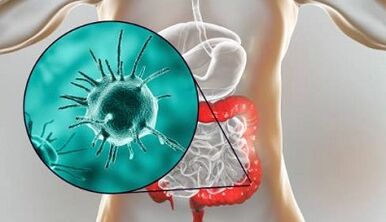
Parasitic diseases are a major category of diseases caused by worms, certain arthropods and protozoa.
Despite great achievements in modern medicine and very developed sanitation conditions, according to statistics, about 90% of the world's people will experience these conditions at least once in their lives.How to suspect a disease and what tests to the parasite can be found in this article.
Types of parasites
Parasites are organisms that rely on the vital activities of organisms to survive.They colonize the human body and cause deficiencies of trace elements, vitamins, proteins and other nutrients during growth and reproduction.They can all lead to the recurrence and exacerbation of chronic diseases and cause internal damage of their own.
The following types of parasites can cause disease in humans:
- Protozoa (amoebae, lamblia);
- Pathogenic microorganisms (Chlamydia, Mycoplasma, etc.);
- Worms (roundworms, pinworms, cattle and pork tapeworms, etc.);
- Parasitic arthropods (Scabies, Demodex).
The main characteristics of the pathology they cause are long-term asymptomatic or low-symptomatic courses.The parasite cleverly hides its existence, trying to "squeeze everything out of the host" until its reserves are exhausted and the organs or tissues are severely damaged.
Symptoms of parasitic diseases
Parasitic diseases are most common in helminthosis - diseases caused by the presence of worms in the body.In most cases, they occur in children, but they can also occur in adults if hygiene rules are ignored.They do not show up in any way for a long time after infection, or are accompanied by subtle symptoms that are often overlooked.

Each disease has certain characteristics, but also has common symptoms:
- Increased headache, dizziness, weakness, and fatigue.These manifestations are the result of poisoning caused by parasitic waste products.
- Aggravate bronchial asthma, allergic rhinitis, dermatitis, and urticaria.They appear due to increased sensitivity to worm cells and their excretion products.
- Digestive system dysfunction (abdominal pain, nausea, vomiting, heartburn, constipation, and diarrhea).Worms parasitizing in the intestinal cavity can cause inflammation and intestinal obstruction due to blockage in the intestinal cavity.
- Anemia, vitamin deficiencies, weight loss.It occurs due to reduced hormone production due to lack of protein, vitamins and trace elements.
- Sleep disturbance, chronic fatigue, irritability, tension, muscle and joint pain.
To detect most types of worms, a stool test or blood donation is required to detect the presence of specific antibodies.You can get tested at a clinic where you live, after admission to hospital, and at any private laboratory.Some medical centers offer extensive examinations, during which you can be diagnosed for the presence of many types of parasites in your body.
Parasite test

In the case of suspected parasitic disease, what tests are needed, the attending student will explain based on the disease complaints, blood dissection and clinical manifestations.
Diagnosis begins with general blood tests.The biggest changes in worm disease will be:
- Lowered hemoglobin levels and a decrease in the number of red blood cells (occurring due to protein and iron deficiencies).
- Increased number of white blood cells, acceleration of ESR (a sign of inflammation of internal organs, especially the gastrointestinal tract).
- Increase in eosinophils (characteristic signs of allergicity in response to the stimulation of worm life).
For a more accurate diagnosis, analysis of worm eggs and scratched feces was used.In the feces study, you can detect pathogens of gastrointestinal diseases, carworm diseases, inflammatory diseases and detect the presence of simple microorganisms (Jidia).
It is important to remember that through one study, the probability of detecting worm eggs in feces is 30%.Therefore, to elucidate the diagnosis in the first negative result, the interval between the studies was 2-4 days.
To increase the accuracy of the study, it is important to carefully prepare stool for analysis.Biological material should be collected only in special sterile containers that can be purchased in pharmacies.A few days before the analysis, you should refuse to eat dyed foods (beets, red berries, exotic fruits, sweets and dyed drinks), refrain from using laxatives, as well as rectal candles.
ELISA
Using ELISA analysis in adults and children, antibodies produced by humans against the presence of foreign bodies can be detected.To do this, blood is needed to be drawn from the veins, and specific IgG antibodies can be detected in the laboratory for giardia, trichomonas, pork and beef tapeworms, trichinidia, echinococcosis, toxocardium, ascariasis, and pinworms.With this study, you can detect the presence of nearly all parasites in the human body.
Preparing for learning is not difficult.The test must be performed on an empty stomach after 8-10 hours in the morning.On the eve of the study, it is recommended not to take antibacterial and antihistamine drugs, nor to eat allergic foods (honey, seafood, exotic fruits and red berries, nuts).Before donating blood, experts recommend resting in the laboratory waiting room for 10-15 minutes.
Study results will be known in 1-2 days.These studies serve as both a preliminary diagnosis and a control for treatment.
Timely detection of parasitic diseases and modern effective treatments can help you avoid complications that endanger health.



























